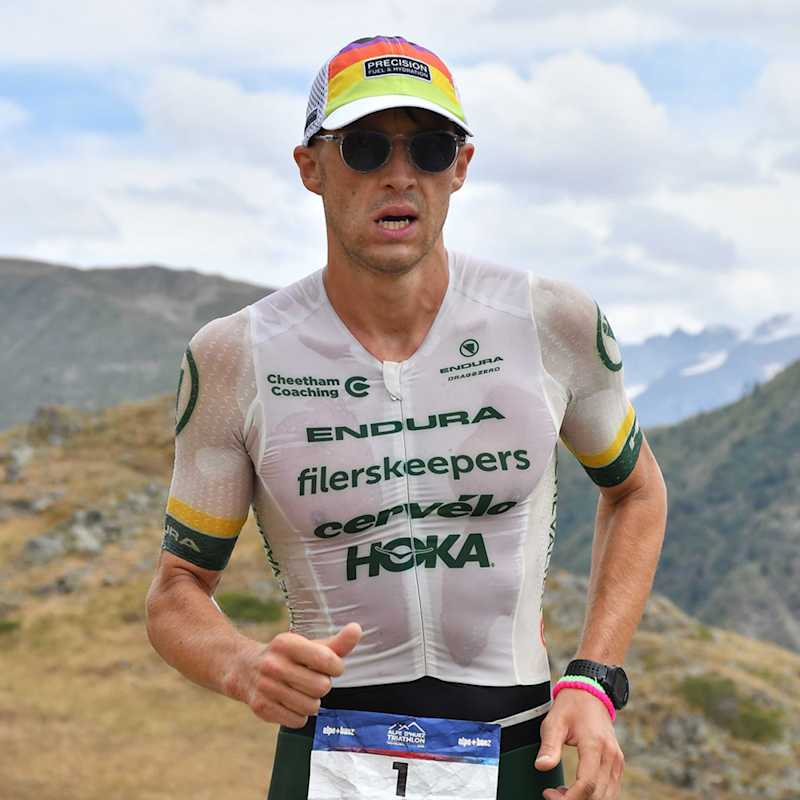
Leon's headline numbers
Leon's strategy
Fueling
Carbohydrate is the main fuel you burn when racing. Failing to fuel properly is a leading cause of underperformance in longer races.
Across the four-hour race, Leon consumed an impressive carb intake with no GI discomfort and consistently high energy levels. He relied more heavily on the bike leg for his carb intake, consuming 43 grams of carb per hour less on the run. We often see this drop off in triathlon races since it’s easier logistically, and on the gut, to consume more carb on the bike than the run. Leon carried two bottles on the bike, each containing one PF 90 Gel and two sachets of PH 1500, a concoction he tested in race simulation training sessions. During the run, he pivoted to using PF 30 Gels, taking one approximately every 20 minutes over the half-marathon distance.
Hydration
Taking on board an appropriate amount of fluid and sodium is essential to maintaining blood volume and supporting the cardiovascular effort needed to perform on race day.
Whilst the absolute amount of sodium and fluid consumed per hour is important, it’s critical to consider these in relation to each other. This is known as 'relative sodium concentration' and it’s expressed in milligrams per litre (mg/L). How much sodium you’re taking in per litre of fluid is more important than the absolute amount taken in per hour.
Sweat sodium concentration (mg/L) is largely genetically determined and remains relatively stable. Knowing how salty your sweat is enables you to replace a good proportion of your sweat losses, which can range from 200-2,000mg/L.
Given Leon’s losses are High (1,331mg/L), nailing his hydration strategy remains important, even when it’s Mild.
Learn moreDuring the race, Leon relied on two bottles on the bike to meet his fluid, carb and sodium needs. This isn’t always the recommended approach, especially if an athlete is sensitive to GI discomfort or the conditions are especially hot and humid, where ‘decoupling’ at least part of their fuel and hydration could be beneficial. However, Leon has put in hours of gut training and is used to getting all ‘three key levers’ from his bottles on the bike, so it was an efficient strategy for this race with the duration and moderate temperature. Leon picked up cups of plain water from the aid stations on the run, but didn’t use any additional electrolytes. We know from his Sweat Test results that Leon has a high sweat sodium concentration, but since he did well to match this on the bike and didn’t drink a large volume of plain water on the run, he managed to stay in line with his losses. To note, he is aware that full IRONMAN® races in hotter conditions can require some sodium to be taken on board during the run leg to maintain performance, so he plans to carry some Electrolyte Capsules with him for these events in the future.
Caffeine
Beyond the Three Levers of Performance (carb, sodium and fluid), caffeine is one of only a few substances that is proven to improve performance for most endurance athletes as it can help stave off mental and physical fatigue.
Leon only had a couple of caffeinated energy gels during the race, leaving him below the scientific recommendations. Since he knows he tolerates caffeine well, consuming some more caffeine next time will lower his level of perceived exertion and further sustain his energy levels.
How Leon hit his numbers
Here's everything that Leon ate and drank on the day...
Leon's weapons of choice
Final thoughts
Leon's full stats
Data Confidence?
There is good confidence in the accuracy of the data reported. An athlete feels that the numbers closely reflect what they consumed despite a couple of estimations which may carry some degree of error. The majority of what was consumed is recorded to a high level of specificity (most volumes are known through the use of bottles brands quantities flavours). The numbers are very plausible and align with previous data recordings (if an athlete has collected data previously).